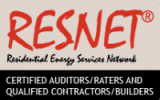Much like knowing how many miles per hour your car gets, your home energy score is an easy way for homeowners to know more about your home’s energy use. This helps current homeowners save money on their energy bills as well as future homeowners looking for energy-efficient homes. Our team here at e3 Power offers the scoring tool to homeowners looking to save money on their energy bills.
What Is the Home Energy Score?
The Home Energy Score (HES) was developed by the Department of Energy. This scoring tool assesses a home’s envelope and major energy systems. When a homeowner gets a HES score they receive three things:
-
An asset score – the score assessed to your home on a scale from 1 to 10 with 1 being the least efficient and 10 being the most efficient
-
Home facts – this includes the square footage of your home, direction of the front door, insulation levels of the walls, ceiling and roof as well as the size and type of the HVAC equipment
-
Improvement recommendations – these recommendations help homeowners save money on their energy bills
The idea of the score is to help homeowners get a better understanding of where their energy is going and for potential homeowners to have a better understanding of what they’re getting themselves in to.
What’s a Good Home Energy Score?
The HES is on a scale from 1 to 10 with 10 being the most efficient and 1 being the least efficient. Usually, 10 means there is almost nothing left you can do to your home to make it more energy-efficient. A score of 1 means that your home is expected to use more energy than 85% of US homes.
If your home scored a 5 it means your home is expected to use less energy than 50% of the US homes. Typically, a score from 6-10 is a good range to shoot for. Those scores mean, while there’s still room for improvement, you are far more efficient than the average household.
How to Improve Your Score
If you received a low HES, it may be time to make fundamental changes to the way you use energy in your home. First, start with the obvious changes. Only use the heater and AC if necessary and turn off lights and TVs in rooms you’re not in.
If your score is still low and you don’t know why it may be time for an energy audit. An energy audit will tell you where your energy is going and what you can do to become more efficient. These audits can also find poor wiring in your home or poorly insulated areas that are causing the energy bill to rise.
Be a Smart Seller and Buyer
If you are looking to sell your home and you have a good HES, be sure to make that known during the selling process. A high HES reflects the investments you’ve put into making the home more efficient. This will only boost the property value of your home.
Transversely, if you are buying a home, you also need to keep the HES in mind. If a home has a high HES, it may be a sign that you’re lining up to take a very expensive energy bill. A higher HES can help you qualify for a larger mortgage or more financing options.
e3 Power Offers HES
Our team here at e3 Power offers a free HES to any of our customers who choose us for an infrared energy audit of their home. Our number one priority is making sure homeowners in the Denver, Colorado area are as energy-efficient as possible. Contact us today. We look forward to helping you!



